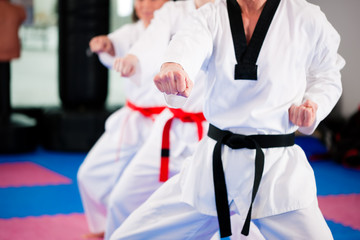Taekwondo’s Positive Impact on Child Development
by Jessica Raykovich, SPT
Student Physical Therapist
Taekwondo is a form of martial arts that has been around for hundreds of years. It stands for Tae=foot/leg, Kwon=fist/fight, and Do=way or discipline. It incorporates various forms of kicking, punching, and blocking all while teaching discipline and respect. So should it be a recommended sport for your children? YES!
Several studies have been completed to look at the effects Taekwondo can have on balance, lower extremity strength, and even communication skills. This is not just for typically developing children, but also for children with Autism Spectrum Disorder (ASD), Developmental Coordination Disorder (DCD), and Down Syndrome.
Taekwondo can improve your child’s balance through kicking. Kicking requires the ability to maintain balance on one leg in order to kick in a controlled manner. Balance is crucial for all children, but especially those with ADS, DCD, and Down Syndrome, as these populations tend to have difficulties with gross motor tasks such as running, jumping, and ascending/descending stairs. Balance is a fundamental skill needed in order to complete those gross motor skills successfully. One study estimated that 73-87% of children with DCD have balance deficits; therefore, balance is an area that needs to be addressed. After all, balance not only helps with gross motor skills, but also reduces the risk of falls and sustaining injury.
In addition to balance, improvements in lower extremity strength can also be seen from participating in this sport, as kicking increases lower extremity and core strength. This can be further increased by hitting a target with power behind it. Maintaining various stances while performing punches, blocks, and kicks is another way Taekwondo can improve lower extremity strength. One example of a stance is a center stance, or wide squat. Holding this position strengthens leg and hip musculature. Strength development is important with all children, but especially those with Down Syndrome, as one characteristic of this condition is low muscle tone. Improving strength is important as it can help children complete age appropriate skills such as squatting, and jumping. Finally, increasing strength can prevent compensatory movements, such as excessive knee or lumbar motion while squatting, thus reducing risk of future injuries.
One study also suggests Taekwondo training can help improve communication skills in children with Autism, although the exact mechanism is unknown. One hypothesis is an increase in brain-derived neutrophic factor (BDNF) after exercising. BDNF plays a role in neurological functioning which helps with improved memory and learning capacity. This may translate to an improvement in communication skills. Approximately 50% of children with Autism do not have functional expressive language. Communication skills are critical for learning and social interacting; therefore any activity that can promote improvements in communication would be important for this population.
Taekwondo is one way to keep your kids active while also having fun! If this is something your and/or your child is interested in, it is important to find a reputable “dojo” or Taekwondo studio that aligns well with your family needs, values, and goals.
Resources:
- Carter K, Horvat M. Effect of Taekwondo Training on Lower Body Strength and Balance in Young Adults with Down Syndrome. Journal of Policy and Practice in Intellectual Disabilities. 2016;13(2):165-172. doi:1111/jppi.12164.
- Bahrami F, Movahedi A, Marandi SM, Sorensen C. The Effect of Karate Techniques Training on Communication Deficit of Children with Autism Spectrum Disorders. Journal of Autism and Developmental Disorders. 2015;46(3):978-986. doi:10.1007/s10803-015-2643-y.
- Fong SS, Tsang WW, Ng Gy. Taekwondo training improves sensory organization and balance control in children with developmental coordination disorder: A randomized controlled trial. Research in Developmental Disabilities. 2012;33(1):85-95, doi: 10.1016/j.ridd.2011.08.023.
- Fong SS, Chung JW, Chow LP, Ma AW, Tsang WW. Differential effect of Taekwondo training on knee muscle strength and reactive and static balance control in children with developmental coordination disorder: A randomized controlled trial. Research in Developmental Disabilities. 2013;34(5):1446-1455. doi: 10.1016/j.ridd.2013.01.025
- Kim Y, Todd T, Fujii T, Lim J-C, Vrongistinos K, Jung T. Effects of Taekwondo intervention on balance in children with autism spectrum disorder. Journal of Exercise Rehabilitation. 2016;12(4):314-319. doi:10.12965/jer.1632634.317.







